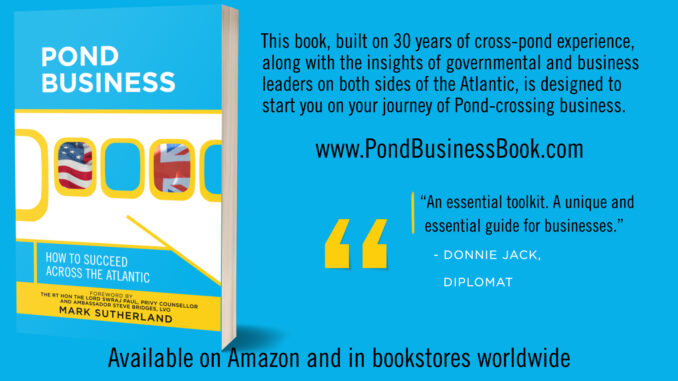
Excerpt from Chapter 1 of “Pond Business: How to Succeed Across the Atlantic” by Mark Sutherland, available from Dunrobin Publishing on Amazon and Amazon UK and in bookstores in the UK and the US.
When I first came to America in 1989, I was met by many interesting and memorable questions. Deep questions of such an esoteric nature that it caused you to pause and contemplate deeply before answering. Brilliant questions such as “Did you drive here?” and “Do they have radios in England?” plus “Isn’t that near Canada?” and my absolute favorite, “What language do they speak in England?”
Thankfully those stunning questions were asked by the minority of Yanks, but it did drive home for me the fact that Americans, as a whole, don’t know much about the UK. And vice versa, I knew little to nothing about the US. My only knowledge of the US, and Missouri where I settled, before setting foot in America was a stunning plethora of educational information as found on the A-Team, the Dukes of Hazard, the television show Dallas, and a travel show on BBC2 that introduced British audiences to St. Louis, Missouri, as the home of brain sandwiches, frozen custard, Budweiser, a big Arch, theme parks, and gospel singers on local television broadcasting from their furniture store.
Both my perspective and the perspectives of the first Americans I met were nowhere near reality. This has thankfully improved over the decades since, especially in my adopted home town of St. Louis, Missouri, which has become quite an international city with many flavors from all over the world—including the UK.
But what is real is that sometimes the communication between a Yank and a Brit can still be completely full of misunderstandings or false assumptions—due to the very words used. We hear them, and think we are speaking the same language. The words used in either country and culture sound similar, most of the time, but the meaning behind them should never be assumed. Because sometimes, just sometimes, they don’t mean what you think they mean.
You can read more about my cross-Pond experiences and insights on how to succeed in your cross-Pond business ventures from corporate, governmental and organizational leaders in both countries in “Pond Business: How to Succeed Across the Atlantic.”